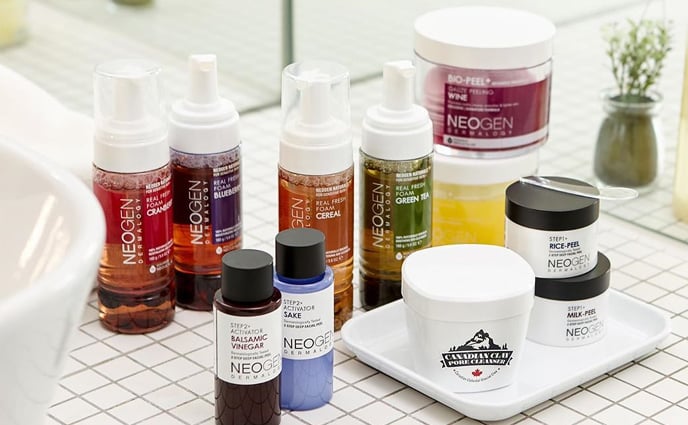We all want to keep our skin plump, hydrated and happy, but it's easy to feel like you've missed the boat when it comes to maximizing preventative measures. So what skin care products and ingredients (and peptides and LED lights and laser treatments) should you be starting with now? And how about in ten years? And ten more? We turned to three of the country's leading dermatologists to find out how to best take of your skin decade, by decade.
Image via Kevork Djansezian/BAFTA LA/Getty Images Entertainment/Getty
"Prevention is key at this age, so you must begin to topically apply products that contain antioxidants and collagen boosting ingredients and remember to wear an SPF every day," says dermatologist and founder of Dr. Dennis Gross Skincare, Dr. Dennis Gross.
Interestingly, modern technology actually poses some risks: "Double chins and sagging above the collarbone from constantly looking down at phones and computers are more visible in the younger demographic," says Dr. Paul Jarrod Frank, cosmetic dermatologist and founder of PFRANKMD & Skin. "Moreover, dehydration from alcohol and excessive amounts of sugar can affect the skin and cause wrinkles down the line, as well as smoking. If you cut these things out in your 20s and 30s, you will look significantly younger in your 40s and 50s."
In other words, it's a good time to start instituting good habits, as well as finding a skin care routine that works for you. "Start with the basics: a cleanser and lukewarm water to remove all traces of makeup and bacteria," advises dermatologist Dr. Michele Green. "If you're acne prone select a gel-based cleanser to get your skin nice and clean." She then recommends applying a toner to prepare the skin for the next step by opening the pores, allowing treatment products to be fully absorbed. "For sensitive skin select a toner with chamomile and green tea that is alcohol-free. If you're acne prone toners with alpha hydroxy, salicylic or glycolic acid are best." Lastly, she recommends a treatment product based on your particular need and a sunscreen (you can also use a treatment product formulated with a sunscreen to cut out one step).
Image via Stephane Cardinale - Corbis/Corbis Entertainment/Getty
"Scientific research shows that at age thirty, collagen and elastin production starts to decline in quantity and quality, so be sure to incorporate a vitamin C product in your daily regimen — it not only protects skin against damaging free radicals, but also stimulates your body's natural production of collagen," says Dr. Gross. "Retinoids, or derivatives of vitamin A, are also an important part of the anti-aging arsenal in this age group because they stimulate the production of new skin cells and inhibit the body's natural enzymes that break down collagen."
This is also the decade where you'll want to start considering professional peels to help firm skin and reduce the appearance of fine lines and wrinkles. "In addition to in-office options, I recommend using at-home versions — like the Alpha Beta Daily Peels — regularly between visits to exfoliate and further battle the onset of wrinkles. Incorporating LED is also a great idea for this age. My SpectraLite FaceWare Pro has both blue and red LED lights to combat adult acne and breakouts and signs of aging."
Image via Steven Ferdman/WireImage/Getty
"By your 40s hormonal changes are apparent and your skin may not look as radiant as it did in your 20s and 30s," says Dr. Green. "It's time to add more hydrating lotions and potions to your skincare." She suggests swapping out your cleanser for a cleansing balm to hydrate your skin as it cleanses and making sure to use a toner that will replenish lost moisture, specifically ones made with aloe.
Exfoliation is also a key step at this age. "Your skin needs all the help it can get to stimulate cell turnover and this will help maintain a healthy complexion," says Dr. Green. You'll also want to step up your treatment product in terms of potency. "Your treatment products in this phase should be lightweight and able to penetrate deeper into your skin to repair and replenish," says Dr. Green. "Look for products containing antioxidants and peptides to stimulate collagen regeneration."
Image via Steve Granitz/WireImage/Getty
In your 50s, your skin drastically changes. "Menopause causes many women to lose fat, which causes skin's elasticity to drop," says Dr. Gross. "This combined with dryness caused by hormonal changes leads to deepened lines and sagging." He suggests looking for moisturizers that contain hyaluronic acid as these work to bring water from the atmosphere into your skin making it look plumper and firmer. "This age group is also prone to redness and irritation, so it's important to look for products that include green tea extract."
But it's not just about your face! Hands start to age at this stage as well. "Fraxel can help reduce pigmentation such as sunspots and it also helps even out skin tone," says Dr. Jarrod Frank. He adds that while at-home peels and retinoids can work to reduce pigmentation and freshen up the skin, they don't penetrate deep enough into the skin where the damage is to make a significant difference in the long run. Instead, he suggests in-office treatments like Restylane.
Image via Daniele Venturelli/WireImage/Getty









